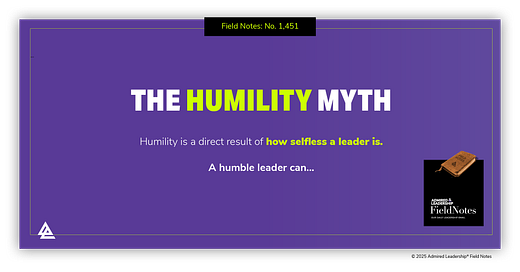Humility is a superpower when possessed by competent and experienced leaders. Humble leaders draw the respect and admiration of everyone around them.
By engaging others with humility, leaders build trust, deepen relationships, become more approachable, and create an atmosphere of openness and collaboration.
While the many virtues of humility are well-known, what makes a leader humble is often misunderstood.
A myth exists about the origin of humility. People often presume humility rises from modesty and unpretentiousness. That to be humble, a leader must be reserved and less prideful.
Humble leaders, we are told, accept criticism gracefully and recognize their limitations. They never act as if they know the answer or boast about their accomplishments. Instead, they acknowledge their flaws and weaknesses openly and with vulnerability.
While modesty, vulnerability, and openness are strong leadership attributes in their own right, they have little to do with humility. Humility isn’t demonstrated by how strongly or quietly a leader projects their views. Nor is it a reflection of how prideful, confident, or unassuming a leader is.
Humility is a direct result of how selfless a leader is. A humble leader can think very highly of themselves. They can be proud of their accomplishments and confident in their skills. They can believe they are in the right and without much doubt.
Yet, they can still project humility by where they place their focus. Humble leaders act in the service of others. As the author Rick Warren once wrote: “Humility is not thinking less of yourself, but thinking of yourself less.”
Humble leaders focus on the needs of others before their own.
Humble leaders celebrate others, not themselves. They are more concerned with getting others heard and less concerned about having others hear them.
They prioritize the needs of others over their own needs. They make decisions that benefit the team and not themselves. They give credit to others while they take the blame. Humble leaders act in the interest of others.
Humility is not a reflection of personality or how a leader presents themselves, whether quiet or outspoken. It is a demonstration of what matters most to them, the person in the mirror or the people they lead.
Some of the most humble leaders are full of confidence, vitality, and excitement, but they direct that energy toward and for the benefit of others.
It is worth remembering that some leaders are modest because they have a lot to be modest about. Don’t confuse an introverted or diffident leader for a humble leader.
Humility is all about who counts most. If, through your actions, you prove it’s you, then humility is not registered, no matter how reserved or modest you are.





This is an important observation. Humility is the willingness to focus on others and the mission first. It is not necessarily self-effacing. In fact, leaders who are too self-effacing and deferential are ineffective and even damaging.
An Interesting perspective about humility, truly insightful. Thank you for sharing.